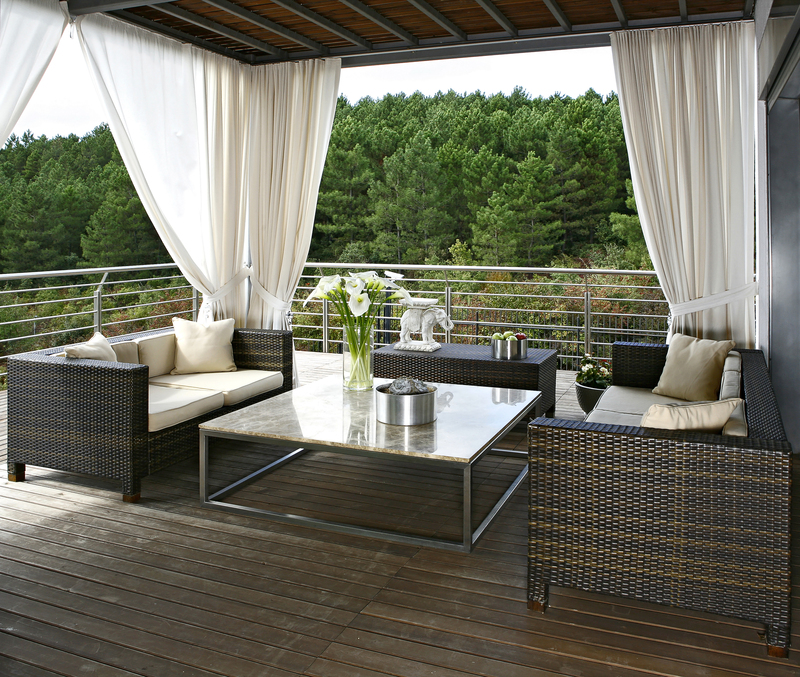A Journey to Serenity with Zen Garden Design Ideas
Posted on 26/08/2025
A Journey to Serenity with Zen Garden Design Ideas
In today's fast-paced and often chaotic world, finding a tranquil space where you can relax and rejuvenate is more important than ever. Zen gardens, also known as Japanese rock gardens or Karesansui, are the embodiment of peace, balance, and simplicity. Whether you have a vast backyard or a tiny balcony, embarking on a journey to serenity with Zen garden design ideas can profoundly enrich your indoor or outdoor environment. In this comprehensive guide, we'll explore the philosophy, key elements, styles, and practical tips to help you create your own harmonious Zen retreat.
The Philosophy Behind Zen Gardens
Zen gardens are deeply rooted in Buddhist philosophy. These gardens aim to promote mindfulness, contemplation, and a tranquil state of mind by reflecting the simplicity and balance found in nature. Originating in Japan during the Muromachi period (1336-1573), Zen gardens were designed for meditation and self-reflection, offering a visual representation of the concept of "wabi-sabi"--the acceptance of transience and imperfection.
Why Choose a Zen Garden?
- Stress Relief: The act of raking gravel or tending to moss-based landscapes can be a meditative activity, helping to reduce anxiety.
- Enhanced Focus: The minimalist approach minimizes distractions, promoting sharper focus and clarity.
- Low Maintenance: Zen gardens usually feature rocks, sand, and evergreens, which require minimal care compared to traditional gardens.
- Aesthetic Appeal: Their understated beauty adds value to any space, indoors or outdoors.

Key Elements of Zen Garden Design
Zen garden designs involve the harmonious arrangement of a few essential elements, each carrying symbolic significance. Here are the main features to consider when designing your own Zen retreat:
1. Rocks and Gravel
- Rocks symbolize mountains or islands, and their placement is often the garden's focal point.
- Gravel or sand represents water. Raking patterns into the gravel evokes the movement of rippling waves, enhancing the sense of tranquility.
2. Water Features
- While classic Zen gardens don't always include water, many modern designs incorporate ponds, waterfalls, or bamboo fountains (also known as Shishi-odoshi) to add soothing sounds and further tranquility.
3. Plants and Moss
- Choose plants that reflect a sense of calm--such as dwarf evergreens, azaleas, ferns, and especially moss, which embodies age and quiet.
- Keep plant choices minimal and focus on shapes and shades of green.
4. Pathways and Bridges
- Stepping stones, gravel paths, or wooden bridges encourage slow, mindful movement through the garden and symbolize the writer's journey of life.
5. Lanterns and Ornaments
- Japanese stone lanterns (toro) are classic features that provide subtle illumination and a touch of tradition.
- Carefully placed sculptures or bamboo fences can add interest without overwhelming the space.
Popular Styles of Zen Gardens
Zen gardens come in many variations, each with its own unique charm. Whether you're inspired by traditional Karesansui designs or modern interpretations, there's a style for every taste and space.
Karesansui (Dry Landscape Garden)
The most iconic Zen garden design features rocks, gravel, and minimal plant life. These gardens are meant to inspire contemplation, distilling landscapes into abstract forms.
- Main features: Raked gravel, standing rocks, little to no water.
- Best for: Small or urban spaces, meditation corners.
Chaniwa (Tea Garden)
Tea gardens are designed as a path to a tea house for the Japanese tea ceremony. These gardens are lush and full of moss, stepping stones, and water features.
- Main features: Winding paths, lanterns, water basin, lush greenery.
- Best for: Larger spaces, those who enjoy hosting gatherings.
Tsuboniwa (Courtyard Garden)
Tsuboniwa are compact Zen-inspired gardens typically found in urban homes or courtyards. They bring serenity to small places through clever use of space and minimalism.
- Main features: Small-scale features, moss, rocks, shade-loving plants.
- Best for: Apartments, courtyards, or balcony gardens.
Step-By-Step: Designing Your Own Zen Garden Retreat
Ready to start your journey to serenity with Zen garden design? Here's an actionable plan:
Step 1: Select the Location
- Assess your space: Zen principles can be applied to areas large and small--from backyards to patios to balconies.
- Consider sunlight and shade: Choose a spot that receives enough light for your chosen plants but retains a sense of privacy.
Step 2: Plan Your Layout
- Sketch a design: Use graph paper or a garden design app. Mark where you'll place rocks, raked areas, plants, and pathways.
- Remember that less is more: Zen gardens are minimalist; avoid overcrowding.
Step 3: Prepare the Ground
- Clear the area: Remove weeds, grass, and debris. Level the ground.
- Lay landscape fabric: This prevents weeds and helps define boundaries.
Step 4: Add Core Elements
- Position rocks first: Choose different sizes and group in odd numbers for natural balance.
- Spread gravel or sand: Fill in the area and rake patterns, such as circles or ripples, to symbolize water.
- Install water features: If desired, add a simple fountain or basin for sound and visual interest.
Step 5: Incorporate Plants and Details
- Plant evergreens and moss: Place these to soften lines and add variety in texture.
- Add stepping stones: Use these to create walking paths and guide movement.
- Place lanterns or ornaments: Use sparingly to maintain focus.
Step 6: Regular Maintenance
- Rake patterns regularly: This not only maintains the look but also serves as a meditative mindfulness practice.
- Trim plants: Keep plants neat and don't let them overgrow the garden's minimalist intent.
- Clean water features: Prevent algae build-up and keep the sounds gentle.
Creative Zen Garden Design Ideas for Your Space
Let's dive into some practical and inspiring Zen garden ideas to make your space unique and serene:
Mini Tabletop Zen Gardens
- Perfect for desks or shelves, these small trays filled with sand, pebbles, and miniature rakes can offer moments of calm throughout your workday.
Modern Zen Courtyards
- Combine minimalist design with bold geometric shapes. Use concrete pavers, black stones, and tufted moss for a contemporary edge.
Vertical Zen Gardens
- Ideal for small spaces, vertical gardens use wall-mounted planters filled with moss, bamboo, and ferns for a lush, green backdrop.
Water-Focused Zen Gardens
- Incorporate a koi pond or bubbling fountain for a sensory boost. The sound and motion of water are traditionally calming.
Rustic Woodland Zen Retreats
- Blend native plants with rocks and boulders under a canopy of trees for a wild, natural look while maintaining Zen principles.
Tips for Achieving Zen Serenity in Your Garden
- Embrace imperfection: Leave room for spontaneity and serendipity. Mistakes and irregularities add character and authenticity.
- Keep it simple: Limit your palette of rocks, plants, and decorations.
- Focus on symmetry and balance: Arrange elements thoughtfully to evoke stability and harmony.
- Prioritize tranquility: Choose calming colors, textures, and materials.

The Ultimate Zen Mindset: Beyond the Garden
Creating a Zen garden isn't just about landscaping--it's about cultivating a peaceful mindset. When you engage with your garden mindfully, you learn to appreciate the present moment, release attachment to perfection, and discover beauty in simplicity.
Whether you're designing a sprawling outdoor haven or a tiny indoor touchstone, your journey to serenity with Zen garden design ideas is a personal adventure. It's a process to be savored, and the tranquil space you create will reward you and your loved ones for years to come.
Conclusion: Bring a Sense of Calm to Your Space
As our lives grow busier and more connected, finding a sanctuary for reflection and tranquility becomes invaluable. A thoughtfully designed Zen garden offers more than just visual beauty--it provides a nurturing, restorative retreat every day. Let these comprehensive Zen garden design ideas inspire your own journey toward a more serene home or workspace. Unleash your creativity, embrace the principles of balance and minimalism, and soon, you'll discover the profound award of introducing Zen-inspired serenity into your daily life.
Latest Posts
Three Foolproof Tips for Successful Weed Management
Tools Every Green Thumb Must Possess
Eco-Friendly Urban Living with Vertical Gardens

